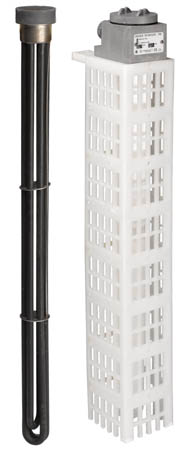Heating Coil Materials: Not All Created Equal
Heating coils for the plating industry come in many different materials to suit many different chemicals. No one would specify PVC pump components when working with acetic acid or acetone – they’re incompatible and the chemical would quickly attack and break down the PVC, leading to a dangerous failure. An immersion heating coil faces the same chemical compatibility issues.

These Quartz Immersion Heaters with Metal Elements: QM Series come as a complete assembly with the metal heating element, polypropylene guards and heavy wall quartz sheath. Replacement parts also available here.
Brass, for example, doesn’t work well in a copper sulfate bath. That’s why immersion heaters and coolers are offered in stainless steel, titanium, zirconium, PTFE, and in other materials. There’s always at least one material that plays well with the plating bath, though each also has other properties that may or may not play well. Choosing incompatible materials will inhibit the plating reaction and cause deposits on or corrosion of the heater.
PTFE, for example, is a relatively soft plastic that gets nicked more easily than more durable metals. Once nicked or cut, the chemical attacks from the inside leading eventually to failure.
See heaters for surface finishing here.
For free guidance in choosing the right heater/cooler and heating coil material for the chemical, 203.740.1877 or sales@reliable-equipment.com.







